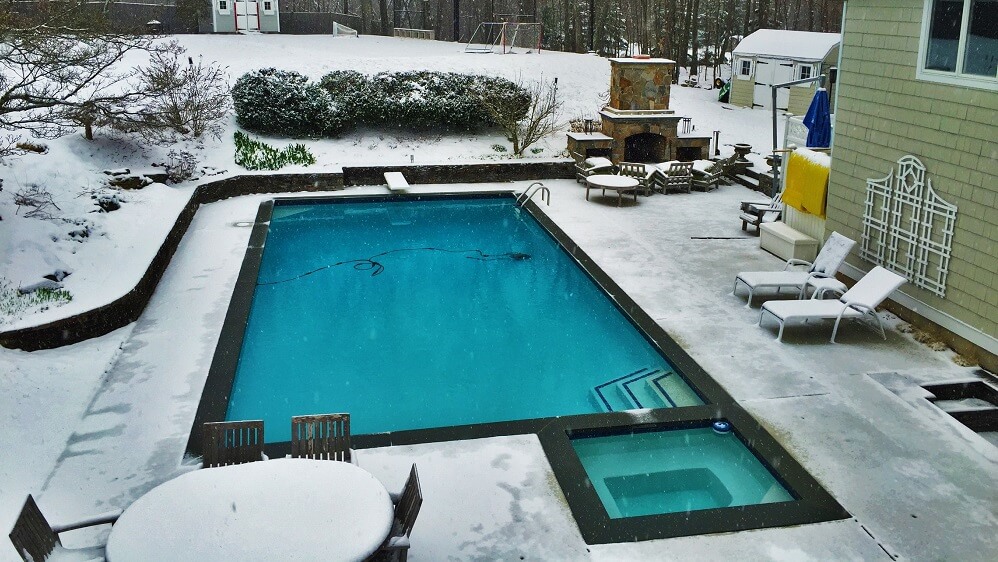Is a Pool Heater Worth It?
While swimming pools always offer a refreshing escape on hot summer days, investing in a pool heater can extend the times at which you can enjoy your pool to nights and cooler months. Northeastern spring and fall, although beautiful, can be chilly, so a pool heater is a great way to lengthen your swimming season. If you’re unsure whether purchasing one is the right option for your property, it may help to explore the different types of heaters available, as well as a few pros and cons of owning one.
Types of Pool Heaters
There are three main types of pool heaters, each with their own advantages and disadvantages:
- Electric heat pumps. This type of heater uses a small amount of energy to transfer heat from the outdoors into the water. Therefore, they tend to work best when the outside air temperature is at least 55 degrees Fahrenheit, although some newer pumps are equipped with technology that enables them to effectively heat the pool in cooler weather. While these heaters carry a higher upfront cost, they are less expensive to operate in the long run and may even pay for themselves over time. Electric heat pumps are also the recommended choice if you want to keep your pool at a set temperature year-round, as they offer a “set-it-and-forget-it” method of heating. Installation Note: Have one of our qualified electrician friends inspect the power you currently have available at the equipment “pad” prior to buying a heat pump. Electrical upgrades may be necessary and knowing in advance is helpful.
- Gas-fired pool heaters. Powered by either natural gas or propane, the main advantage of gas heaters is that they can heat the water quickly regardless of outside temperature. This makes them the better option if you only use your pool periodically, or if you want to use the same heater for an attached spa. However, gas heaters are less energy-efficient and therefore more expensive to operate over time.
- Solar heaters. As the most environmentally friendly option, solar pool heaters warm your pool using thermal energy from the sun. While these heaters are relatively inexpensive to operate (despite their higher upfront costs), they require space-consuming solar energy collectors and won’t work well in cloudy weather or overnight, especially in the Northeast. Something to consider is that solar supplies a lot of heat when it is not needed as much and supplies very little when we want it most.
Pros and Cons of Having a Pool Heater
While the decision of whether or not a pool heater is worthwhile will depend on your budget and lifestyle, considering the pros and cons of this investment can help guide you:
- Pro: Extended swimming season. The most compelling advantage of a pool heater is the ability to extend your swimming season. Without a heater, pools in the Northeast are typically usable only during late spring, summer, and early fall. A heater can add months to this timeframe, allowing for comfortable swimming even in cooler temperatures.
- Pro: Comfortable water temperature. A pool heater ensures that the water stays at a consistently comfortable temperature, despite weather fluctuations.
- Pro: Greater return on investment. A backyard swimming pool is a significant investment, and extending the times at which you’re able to enjoy it will maximize the return you’ll get from your investment. Having a pool heater may even contribute to a higher property value should you ever decide to sell your home.
- Con: The primary drawback of pool heaters is the cost. Purchasing and installing a heater may carry a significant price tag, and with the exception of solar heaters, the costs of operating it over time will add up.
- Con: Maintenance requirements. As with your pool itself, pool heaters require regular maintenance to function optimally. This may include annual servicing and potential repairs, adding to the long-term cost of ownership (heat pumps requires the least amount of servicing).
- Con: Environmental impact. Depending on the type of heater you choose, there can be environmental concerns. Gas heaters, for example, emit carbon dioxide, thereby contributing to greenhouse gas emissions. While cleaner, electric heat pumps often rely on non-renewable energy sources.
Although they may carry some drawbacks, pool heaters can significantly enhance your enjoyment of your pool, offering the luxury of a warm swim even in cooler months. To learn more about the different options available, get in touch with the pool experts at Aqua Pool & Patio today!




